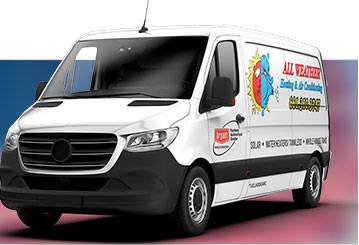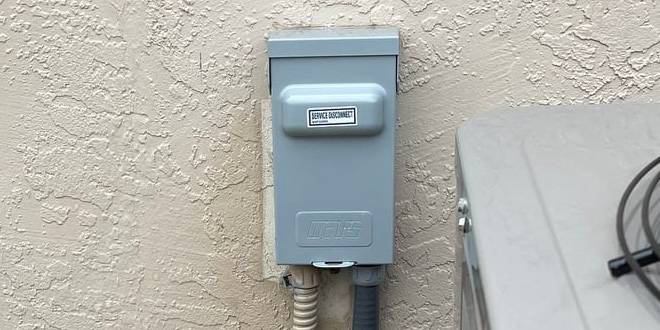
Air conditioners are essential for maintaining comfort in your home, especially during the hot summer months. However, if your AC unit is frequently tripping the breaker, it can be a source of frustration and discomfort. This issue often indicates underlying problems that, if not addressed promptly, could lead to more serious damage and costly repairs. Tripping breakers serve as a protective measure, preventing electrical overloads or short circuits. This blog will explore common reasons why your AC might trip the breaker, offer troubleshooting tips, and guide when to call a professional. Understanding these issues can help you keep your home cool and comfortable while protecting your HVAC system from potential damage.
Key Points Covered
- Common causes of AC breaker trips
- Troubleshooting tips for homeowners
- When to call a professional HVAC technician
- Prevention tips for maintaining your AC
- Importance of regular maintenance and inspections
Glossary of Terms
- Circuit Breaker: A safety device designed to automatically stop the flow of electricity in a circuit as a protection against overloads or short circuits.
- Refrigerant: A substance used in the cooling mechanism of an air conditioner to absorb and release heat, facilitating the cooling process.
- Compressor: The component in the AC system that compresses the refrigerant and circulates it through the coils to release absorbed heat outside.
- Evaporator Coils: The part of the air conditioner that absorbs heat from the air inside your home, aiding in the cooling process.
- Condenser Coils: Located in the outdoor unit, these coils release the absorbed heat outside, completing the cooling cycle.
Common Causes of AC Breaker Trips
Several factors can cause an air conditioner to trip the breaker. Identifying these issues early can help prevent further complications. Here are some common reasons:
Dirty Air Filters: Clogged air filters restrict airflow, forcing the system to work harder to circulate air throughout your home. This added strain can cause the system to overheat, leading to frequent breaker trips. Regularly replacing or cleaning your air filters can prevent this issue and ensure optimal airflow.
Refrigerant Leaks: Low refrigerant levels often lead to the compressor overworking, which can trip the breaker. Refrigerant leaks not only compromise the efficiency of your system but can also damage the compressor over time. It’s crucial to have a professional HVAC technician detect and fix any refrigerant leaks to maintain your system’s efficiency and prevent potential damage.
Faulty Components: Malfunctioning parts, such as the compressor, motor, or capacitor, can lead to electrical issues that cause the breaker to trip. These components are essential for the proper functioning of your AC system, and any faults can result in system inefficiencies and potential damage. Professional assessment and repair of these components are often necessary to restore your system’s functionality.
Overloaded Circuit: In some cases, the AC unit shares a circuit with other high-power devices, which can overload the circuit and trip the breaker. Ensuring that your AC unit has its dedicated circuit can help resolve this issue and prevent future breaker trips.
Short Circuits: Electrical shorts within the AC system can cause a sudden surge of electricity, tripping the breaker. This is a serious issue that requires immediate attention from an HVAC professional to prevent potential hazards.
For more detailed insights, visit our Vacaville AC Repair page.
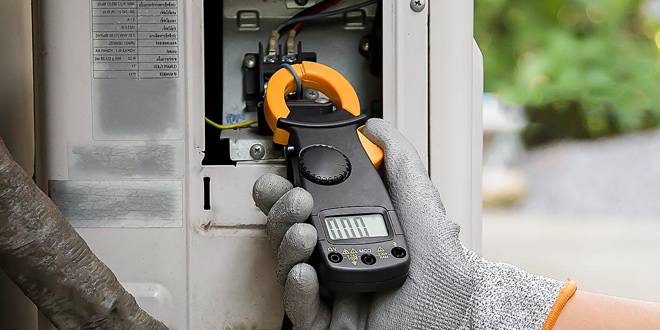
Troubleshooting Tips for Homeowners
Before calling a professional, there are several troubleshooting steps you can take to address the issue:
Check the Air Filter: Start by inspecting the air filter. If it’s dirty, replace or clean it to improve airflow and reduce strain on the system. Regular filter maintenance is a simple yet effective way to prevent many common AC issues.
Inspect the Thermostat Settings: Ensure that the thermostat is set correctly and hasn’t been accidentally changed. A misconfigured thermostat can cause the system to run inefficiently and potentially trip the breaker.
Look for Blockages: Check for any obstructions around the outdoor unit that could impede airflow. Clear away any debris, plants, or other obstacles to ensure proper ventilation and system efficiency.
Reset the Breaker: After addressing any obvious issues, try resetting the breaker. If it trips again, it’s a sign of a more serious problem that requires professional intervention.
Listen for Unusual Noises: Pay attention to any strange noises coming from the unit, as these can indicate component issues, such as a failing motor or loose parts. Identifying these signs early can prevent more significant damage and costly repairs.
Regular maintenance can prevent many common AC issues. Consider signing up for our Maintenance Agreement for scheduled check-ups and peace of mind.
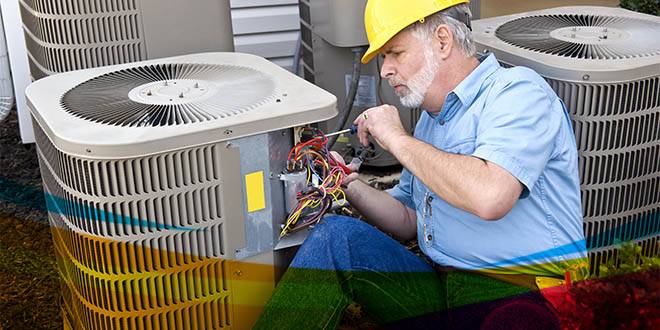
When to Call a Professional
While some issues can be resolved with simple troubleshooting, others require the expertise of a trained HVAC technician. Here’s when to call in the pros:
Repeated Breaker Trips: If the breaker continues to trip after basic troubleshooting, it’s time to call a professional. Persistent breaker trips indicate underlying issues that need expert attention.
Refrigerant Issues: Only a licensed technician should handle refrigerant, so contact a professional if you suspect a leak. Handling refrigerant without proper training can be dangerous and lead to system damage.
Electrical Concerns: Issues like short circuits or faulty wiring should be addressed by an expert to ensure safety and prevent electrical hazards. Professional technicians have the knowledge and tools necessary to safely resolve these issues.
Unresolved Component Failures: If you suspect a component issue, such as a faulty compressor or motor, professional assessment and repair are necessary to restore your system’s functionality.
Explore our Vacaville AC Maintenance services for expert help.
Quick Reference for AC Issues and Solutions
| Issue | Possible Cause | Solution |
| AC trips breaker occasionally | Dirty air filter | Replace or clean the filter regularly |
| Frequent breaker trips | Low refrigerant levels | Contact professional for leak detection and repair |
| AC won’t turn on | Overloaded circuit | Ensure AC has a dedicated circuit |
| Unusual noises | Faulty motor or components | Schedule a professional inspection |
| Weak airflow | Blocked vents or coils | Clear obstructions and clean coils |
Prevention Tips and Regular Maintenance
To minimize the risk of your AC tripping the breaker, consider these preventive measures:
Schedule Regular Maintenance: Regular check-ups can catch issues early and keep your system running efficiently. Our Vacaville AC Maintenance service offers comprehensive inspections to ensure your system’s longevity and performance.
Keep the Area Around the Unit Clear: Ensure that the outdoor unit has adequate airflow by keeping the area around it free from debris, plants, and other obstructions. Proper ventilation is essential for efficient system operation.
Install a Programmable Thermostat: A programmable thermostat can help manage your AC’s workload and improve energy efficiency by allowing you to set temperature schedules that match your lifestyle.
Monitor Energy Use: Keep an eye on your energy bills for any unusual spikes, which can indicate inefficiencies or system problems. Identifying these issues early can help prevent more significant complications.
For new installations or upgrades, visit our Vacaville AC Installation page.
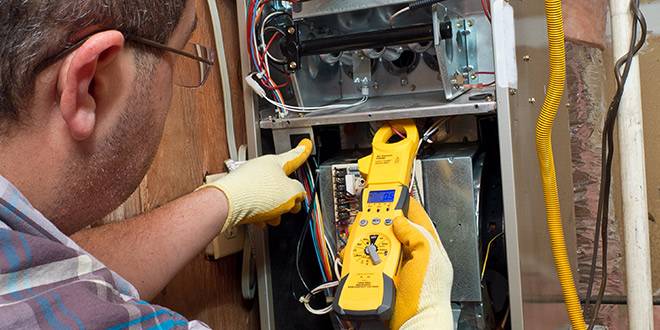
Fun Facts About Air Conditioning and Circuit Breakers
The history and development of air conditioning and circuit breakers offer some interesting insights:
- The first modern air conditioner was invented in 1902 by Willis Carrier, not for comfort, but to control humidity in a printing plant. This invention paved the way for the development of residential and commercial air conditioning systems.
- Air conditioners don’t just cool air; they also filter and dehumidify it, improving indoor air quality. For more information, see our Vacaville Indoor Air Quality page. Proper indoor air quality management can significantly impact your health and comfort.
- Circuit breakers were developed in the early 20th century, transforming how we safely manage electricity in homes and businesses. These devices have become essential components of modern electrical systems, ensuring safety and reliability.
- The world’s largest air conditioning system is in Mecca, Saudi Arabia, providing cooling to the millions of pilgrims visiting annually. This massive system showcases the incredible advancements in HVAC technology and its ability to manage large-scale cooling needs.
FAQ Section
1. What should I do if my AC trips the breaker?
First, try basic troubleshooting: check the air filter, inspect thermostat settings, and look for blockages. If the problem persists, contact a professional to assess and resolve the issue.
2. Can a tripped breaker damage my AC unit?
Repeated trips can cause wear on the system and potentially damage components, so it’s important to address the issue promptly to prevent further complications.
3. How often should I replace my AC filter?
Generally, replace your AC filter every 1-3 months, depending on usage and the type of filter you use. Regular replacement helps maintain airflow and system efficiency, reducing the risk of problems.
4. Is it safe to reset the breaker myself?
You can safely reset the breaker once. If it trips again, further investigation by a professional is necessary to avoid electrical hazards and potential damage to your system.
5. What are the signs of a refrigerant leak?
Look for reduced cooling performance, hissing sounds, or ice forming on the evaporator coils. Professional inspection is needed for confirmation and repair of refrigerant leaks.
6. Why does my AC trip the breaker only on hot days?
High temperatures can cause the system to work harder, potentially leading to overheating or component strain. Regular maintenance can help manage the load and prevent overheating.
7. Can I perform maintenance on my AC myself?
While some basic tasks, like changing filters, can be done by homeowners, more complex maintenance should be performed by professionals to ensure safety and efficacy. Regular professional inspections can help catch issues early and maintain system efficiency.
8. What if my AC is still under warranty?
If your AC is under warranty, contact the manufacturer or the company that installed it for service options. Using unauthorized technicians might void the warranty, so always verify service provider credentials.
For more FAQs or to schedule service, please contact us.
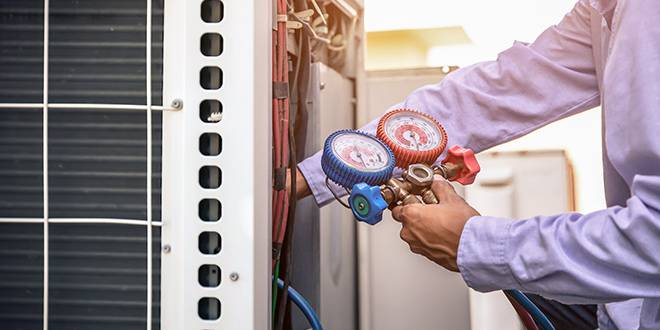
Final Thoughts and Next Steps
Dealing with an AC unit that keeps tripping the breaker can be frustrating, but understanding the common causes and solutions can help you address the issue effectively. Regular maintenance is key to preventing these problems and ensuring your system runs efficiently. If you’re facing persistent issues or need expert advice, All Weather Heating & Air Conditioning is here to help. Contact us today for professional assistance and ensure your home stays cool and comfortable all year round! ????

